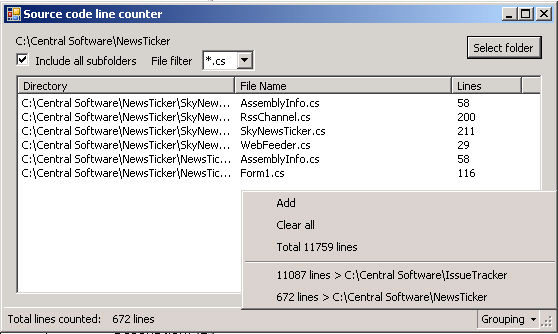
Introduction
While updating my cv, I wanted a quick way of seeing how many lines of code my application contained (160,430 lines!). I haven't looked into Visual Studio Add-ins too much so I wrote a simple stand-alone application that has a few nice features.
Using the Application
Fire up the application and select a folder which contains your code or projects - that's it. The application then searches for all code files and counts every line of code. It displays the files included along the line count. It then generates a total at the bottom.
Checking the "Include subfolders" will instruct the software to search all the sub folders, and you also have the option to look for particular source files, *.cs for C# and *.vb for VB.net.
Nice Feature
Some of my projects are spread across two folders, (client / server) so I needed a way of adding these two totals together. After calculating the total for one folder, you can click on the Grouping > Add menu to add the total and directory to a list. As you tally up the folders a total is show in the menu.
Not a lot of Code
There isn't a lot of code to this but here's the important parts.
Using the DirectoryInfo.GetFiles function allows for easy use of searching just a folder or all folders contained within it with a search pattern, *.cs or *.vb. It's fast and saves time having to write your own recursive function.
DirectoryInfo dir = new DirectoryInfo(folderBrowserDialog1.SelectedPath);
FileInfo[] files = dir.GetFiles(cmbSearchPattern.SelectedItem.ToString(),
(chkIncludeSubfolders.Checked ? SearchOption.AllDirectories :
SearchOption.TopDirectoryOnly));
In case you aren't familiar with the inline if statement I hope this makes it a little clearer.
(true_or_false ? Do_this_if_true : Do_this_if_false)
(chkIncludeSubfolders.Checked ? SearchOption.AllDirectories :
SearchOption.TopDirectoryOnly));
Counting the lines
I figured that to count the lines I should open the text and use a RegEx "\n" to calculate the lines, but I guess that the RegEx is doing the same thing I would which is open the file and read each line. So I just use a loop to count the lines, which is just as quick I reckon.
reader = file.OpenText();
while (reader.ReadLine() != null)
{
fileCounter++;
}
reader.Close();
Collection.RemoveAt
Got stuck trying to remove items within a collection because I only need to remove a certain amount of items from a particular index. Items 0 to 3 contain the Add, Clear All, Total and a Separator. This solution below sorts this out.
for (int i = 4; i < toolStripGrouping.DropDownItems.Count; i++)
{
toolStripGrouping.DropDownItems.RemoveAt(i);
}
int count = toolStripGrouping.DropDownItems.Count;
for (int i = 4; i < count; i++)
{
toolStripGrouping.DropDownItems.RemoveAt(4);
}
Line Counter Code
The updated line counter code was changed to include or exclude certain lines. The easiest way for me to do this was to first remove the "\t" tabs from the line and then investigate the line of code.
s = s.Replace("\t", "");
if (s.StartsWith("//"))
{
dontCount = true;
}
if (s == "")
{
dontCount = true;
}
if (autoGeneratedCode)
{
if (s.Contains("#endregion"))
{
dontCount = true;
autoGeneratedCode = false;
}
}
else if (s == "#region Windows Form Designer generated code")
{
dontCount = true;
autoGeneratedCode = true;
}
History of Searches
I thought that re-browsing projects I have already counted was getting a bit repetitive so adding a history made sense.
Basically it works like this: if a search is performed it checks to see if it exists in the history stored in the ToolStripItems. If it does then it just moves that ToolStripItem to the top using the Insert function with a index set to 0. If it doesn't then it first checks to see if it has reached the maximum amount allowed (currently 5), removing the last one if it has and inserting the new search into index.
private void AddToFolderHistory(string FolderPath)
{
ToolStripItem[] searchItems = btnBrowse.DropDownItems.Find(FolderPath,
true);
if (searchItems.Length == 0)
{
if (btnBrowse.DropDownItems.Count == maximumHistory)
{
btnBrowse.DropDownItems.RemoveAt(maximumHistory-1);
}
ToolStripMenuItem item = new ToolStripMenuItem();
item.Name = item.Text = FolderPath;
item.Click += new EventHandler(FolderHistory_Click);
this.btnBrowse.DropDownItems.Insert(0, item);
}
else
{
this.btnBrowse.DropDownItems.Insert(0, searchItems[0]);
}
}
private void FolderHistory_Click(object sender, EventArgs e)
{
lblFolder.Text = ((ToolStripMenuItem)sender).Text;
this.btnBrowse.DropDownItems.Insert(0, ((ToolStripMenuItem)sender));
CountFiles(lblFolder.Text);
}
Conclusion
In my opinion, a neat little application that does exactly what it says on the tin. It's helped with my cv but no job offers just yet!
History
- Added the ability to not count blank lines, comments, Visual Studio auto-generated code, or designer files. This is accessed through the File Options menu items.

- Changed the search routine so that you can browse multiple extensions (*.cs|*.vb) at the same time.
- Copy the current list of files and number of lines to the clipboard for email/printing
- Redesigned the Browse feature with a Toolbar
- Added a Recount button
- A quick history list of the last 5 (configurable in code) searches - explained below.
- Add the additional code to filter vb files.

If someone could send me the "#region" and "#endregion" in C++.net I can add this to the routine as well.
No ASPX just yet. I have a real software job to do.
